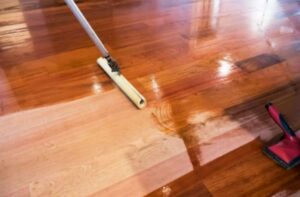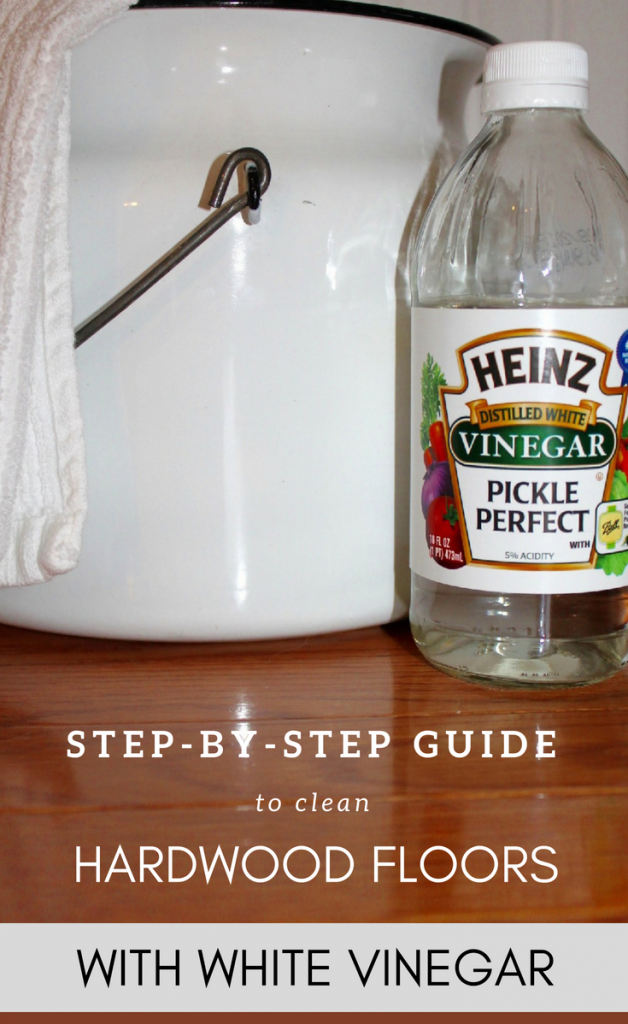Have you ever stared at your hardwood floors, lamenting the dust bunnies, scuff marks, and general grime that seem to accumulate like magic? With all the cleaning products on the market, finding a safe and effective solution for your delicate hardwood floors can feel like a chore in itself. One cleaning agent that pops up again and again in DIY cleaning tips is white vinegar. But can you really use this kitchen staple on your hardwood floors?

Image: flooringflow.com
Here’s the truth: white vinegar has become a popular household cleaner for a good reason. It’s natural, non-toxic, and surprisingly effective against a variety of messes. But when it comes to your hardwood floors, the situation is a little more nuanced. This article will delve into the do’s and don’ts of using white vinegar on hardwood floors, providing you with the knowledge to make informed cleaning decisions for your home.
The Benefits of White Vinegar for Cleaning
White vinegar is a powerhouse in the cleaning world, revered for its versatility and effectiveness. It’s a natural disinfectant, fighting bacteria and mold with ease. Its acidic nature breaks down grease, grime, and even soap scum. It’s also a natural deodorizer, tackling unpleasant smells like pet accidents or smoke odors. In addition, white vinegar is a powerful stain remover, especially effective at tackling water stains and mineral deposits. For many surfaces, a simple solution of white vinegar and water does wonders.
The Dilemma of Hardwood Floors and White Vinegar
While white vinegar offers numerous benefits, its application on hardwood floors requires careful consideration. Hardwood floors are a significant investment in any home, and their beauty and value hinge on proper care. The main concern regarding white vinegar on hardwood surfaces is its acidity. Though dilute vinegar solutions are often recommended, prolonged exposure or overuse can lead to damage, particularly on finished floors. The vinegar can strip away the protective finish over time, leaving the wood vulnerable to scratches, water damage, and dullness.
Understanding Hardwood Finishes
Hardwood finishes are the protective layer that safeguards the wood beneath. They come in various forms, each with unique characteristics.
- Polyurethane: The most common finish for hardwood floors, polyurethane creates a durable, moisture-resistant surface that’s easy to clean. However, it can be susceptible to damage from strong chemicals, including vinegar.
- Oil-based varnishes: While less common, these varnishes offer a beautiful, natural-looking finish. However, they are more sensitive to water and chemicals than polyurethane.
- Wax: Wax finishes offer a softer, more rustic look and provide excellent protection against scratches. However, they require more frequent maintenance than other finishes.

Image: cleaninginstructor.com
The Risks of Using Vinegar on Finished Hardwood Floors
While the effects of vinegar on unfinished hardwood are less significant, using it on finished floors can lead to several problems:
- Stripping the finish: Vinegar’s acidic properties can wear down the protective finish over time, leaving the wood exposed to damage.
- Dullness: The vinegar can cause the finish to dull and lose its shine, making the floors look older and less appealing.
- Uneven finish: The acidity can cause the finish to become uneven, leaving streaks and patches that are difficult to remove.
- Damage to wood: In extreme cases, vinegar can actually damage the wood itself, causing it to become brittle and prone to cracking.
When and How to Use Vinegar on Hardwood Floors
While the risks are real, there are still situations where a diluted solution of white vinegar can be safely used on hardwood floors:
- Cleaning minor spills: A diluted vinegar solution (one part white vinegar to three parts water) can be effective for cleaning up accidental spills, especially if the spill is caught quickly.
- Removing sticky residue: Vinegar can help dissolve sticky residue left by spilled food, glue, or other substances, but it should be applied sparingly.
- Fresh stains: For fresh stains, a damp cloth with a diluted vinegar solution can help prevent the stain from setting.
- Unsealed wood: Vinegar is safe to use on unfinished hardwood floors, as it won’t affect the natural wood.
Important Considerations for Using Vinegar
- Dilute your vinegar solution: Never use full-strength vinegar on hardwood floors. Always dilute it with water in a ratio of one part vinegar to three parts water.
- Test in an inconspicuous area: Before applying vinegar to your entire floor, test it in an inconspicuous area to see how the finish reacts.
- Avoid saturating the floor: Apply the vinegar solution with a damp cloth, never a soaked one.
- Rinse thoroughly: After cleaning, rinse the floor with clean water to remove any remaining vinegar residue.
- Dry immediately: Dry the floor well with a clean, dry cloth to prevent water damage.
- Use a wood floor cleaner: For regular cleaning, always use a cleaner specifically designed for hardwood floors.
Alternative Cleaning Solutions for Hardwood Floors
If you’re hesitant about using vinegar on your hardwood floors, there are several other effective and safe cleaners available:
- Soap and water: A simple solution of mild soap and warm water can effectively clean most hardwood floors.
- Wood floor cleaner: Commercial cleaners designed for hardwood floors are safe and effective. Look for cleaners that are pH neutral and don’t contain harsh chemicals.
- Microfiber cloths: These cloths are excellent for cleaning and polishing hardwood floors without leaving streaks.
Can You Use White Vinegar On Hardwood Floors
Conclusion
While white vinegar can be a helpful cleaning agent in certain situations, it’s important to exercise caution when it comes to hardwood floors. The acidic properties of vinegar can damage the finish over time, leaving the wood vulnerable. If you’re unsure about using vinegar, err on the side of caution and choose a cleaning solution specifically designed for hardwood floors. Remember that the key to keeping your hardwood floors beautiful and lasting is a combination of regular cleaning, proper maintenance, and a bit of common sense.






